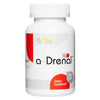New website, same quality supplements & vitamins! Share feedback

Can vitamin D help you fight COVID-19?
This year has reminded us that safeguarding our health is an incredibly important, ongoing effort. Right now, researchers are making connections between vitamin D deficiency and more severe cases of COVID-19. Can a vitamin D supplement help protect you? Let’s find out.
What does the research say?
Researchers evaluated data from over 20 different countries, linking a higher rate of severe COVID-19 cases and deaths in countries where people had the lowest levels of vitamin D.
Experts say that having healthy blood levels of vitamin D may give COVID-19 patients a survival advantage by helping them avoid cytokine storm -- a condition where the immune system overreacts and attacks the body’s cells and tissues.
These early research studies have not yet been peer-reviewed, and other experts do not believe there is proof that vitamin D could prevent or help fight COVID-19. Researchers are working hard to figure out the connection. There are currently over 25 studies, in the U.S and across the globe, where experts are evaluating vitamin D's role in preventing or easing COVID-19.

In the meantime, people say there’s no harm in taking normal doses of vitamin D as a precaution to prevent a deficiency in your body.
Vitamin D Deficiency
How do you know if you have proper levels of vitamin D in your body? A simple blood test can give you the answer and should be done if you think you are at risk of a deficiency. Vitamin D deficiency can occur for a number of reasons:
- You don't consume enough vitamin D in your diet. This can happen if you follow a strict vegan diet, as most of the natural sources are animal-based (fish, egg yolks, fortified milk, etc.).
- Limited exposure to sunlight. Your body makes vitamin D when your skin is exposed to sunlight, so being homebound, living in northern latitudes, wearing long robes or head coverings for religious reasons, etc., can set you up for a deficiency in this nutrient.
- You have dark skin. Melanin pigment reduces the skin's ability to make vitamin D in response to sunlight exposure. Some studies show that older adults with darker skin are at high risk of low vitamin D levels.
- Your kidneys cannot convert vitamin D. In aging people, the kidneys are less able to convert vitamin D to its active form, thus increasing their risk of vitamin D deficiency.
- Medical conditions affecting the digestive tract may decrease your ability to adequately absorb vitamin D. I.e. Crohn's disease, cystic fibrosis, and celiac disease can affect your intestine's ability to absorb vitamin D from food.
- Obesity. Vitamin D is extracted from the blood by fat cells, altering its release into the circulation. People with a body mass index of 30 or greater often have low blood levels of vitamin D.

Do you need more vitamin D?
Vitamin D prevents our immune systems from becoming dangerously overactive, and so the research says that healthy levels of vitamin D may protect against developing severe complications from COVID-19, including death. However, the researchers do say that this doesn't mean that we should all start taking vitamin D supplements.
"While I think it is important for people to know that vitamin D deficiency might play a role in mortality, we don't need to push vitamin D on everybody," said Vadim Backman, a professor of biomedical engineering at Northwestern who led the research. "It will not prevent a patient from contracting the virus, but it may reduce complications and prevent death in those who are infected."
If you believe you have the risk factors for a vitamin D deficiency, it may be important to ensure you’re modifying your lifestyle to consume or create enough vitamin D in your body or begin taking a vitamin D supplement. You can also have a blood test to determine the levels of vitamin D in your body and then create a plan with your doctor or consult with a www.camformulas.com pharmacist.
Vitamin D supplements are available at www.camformulas.com.




